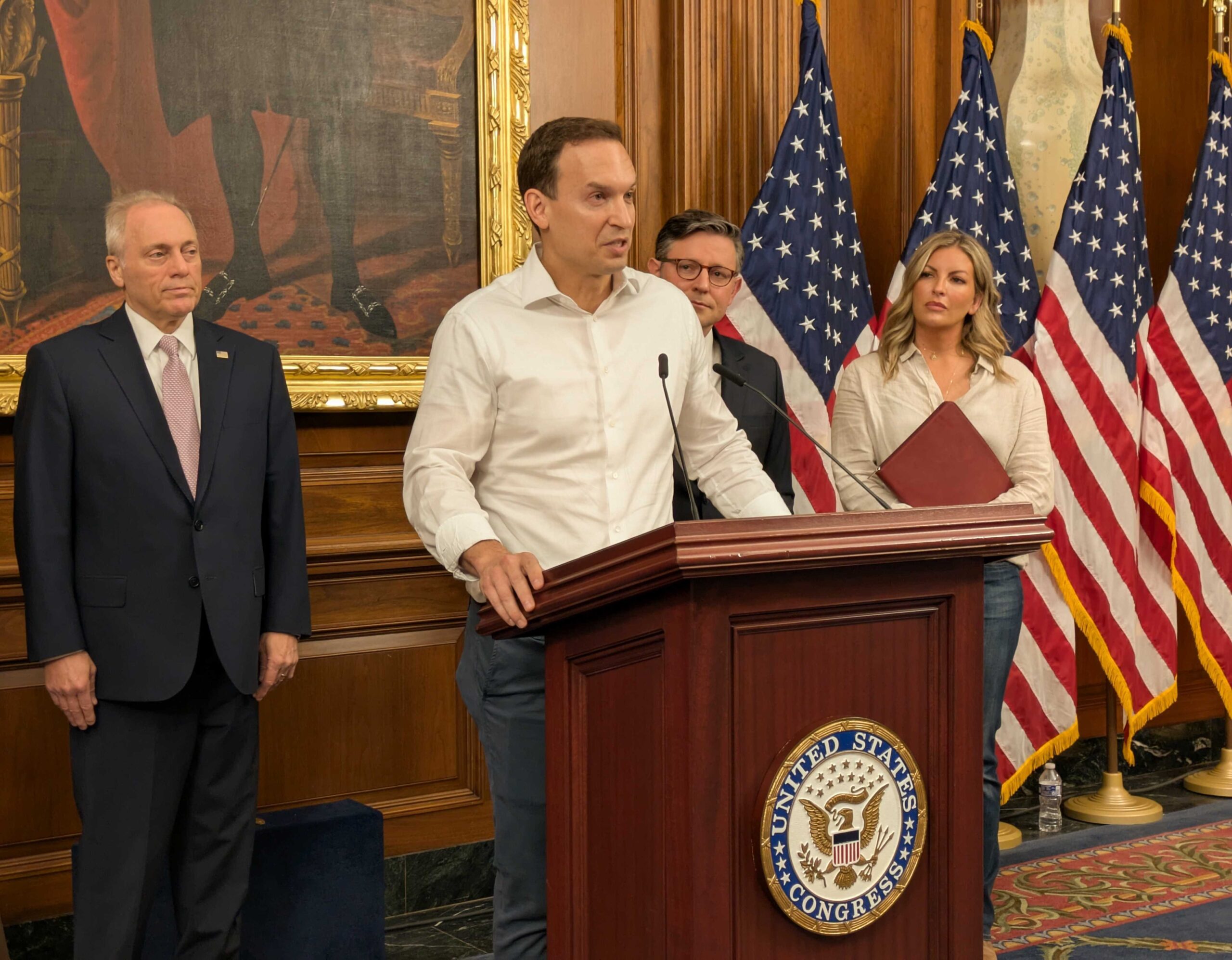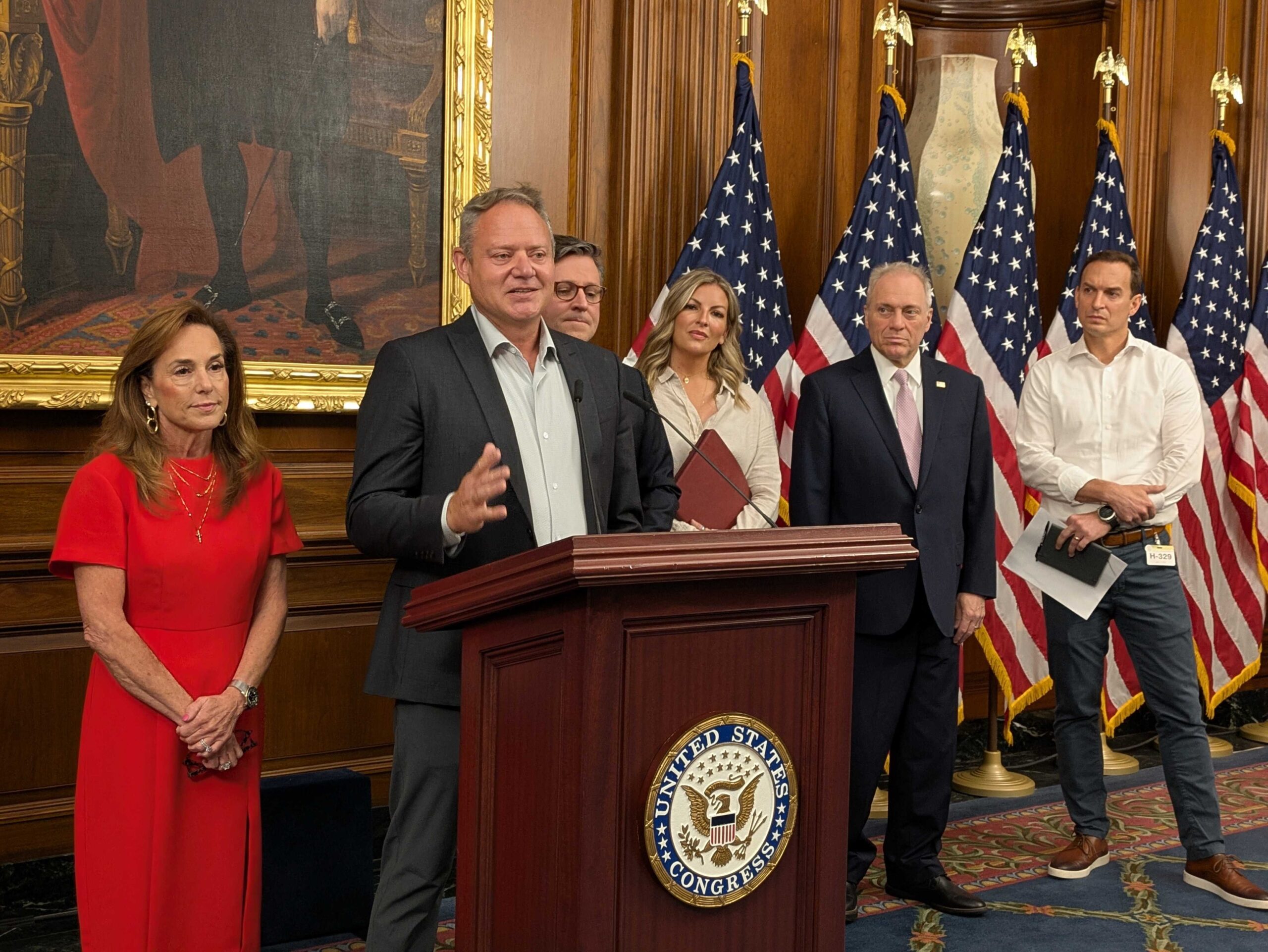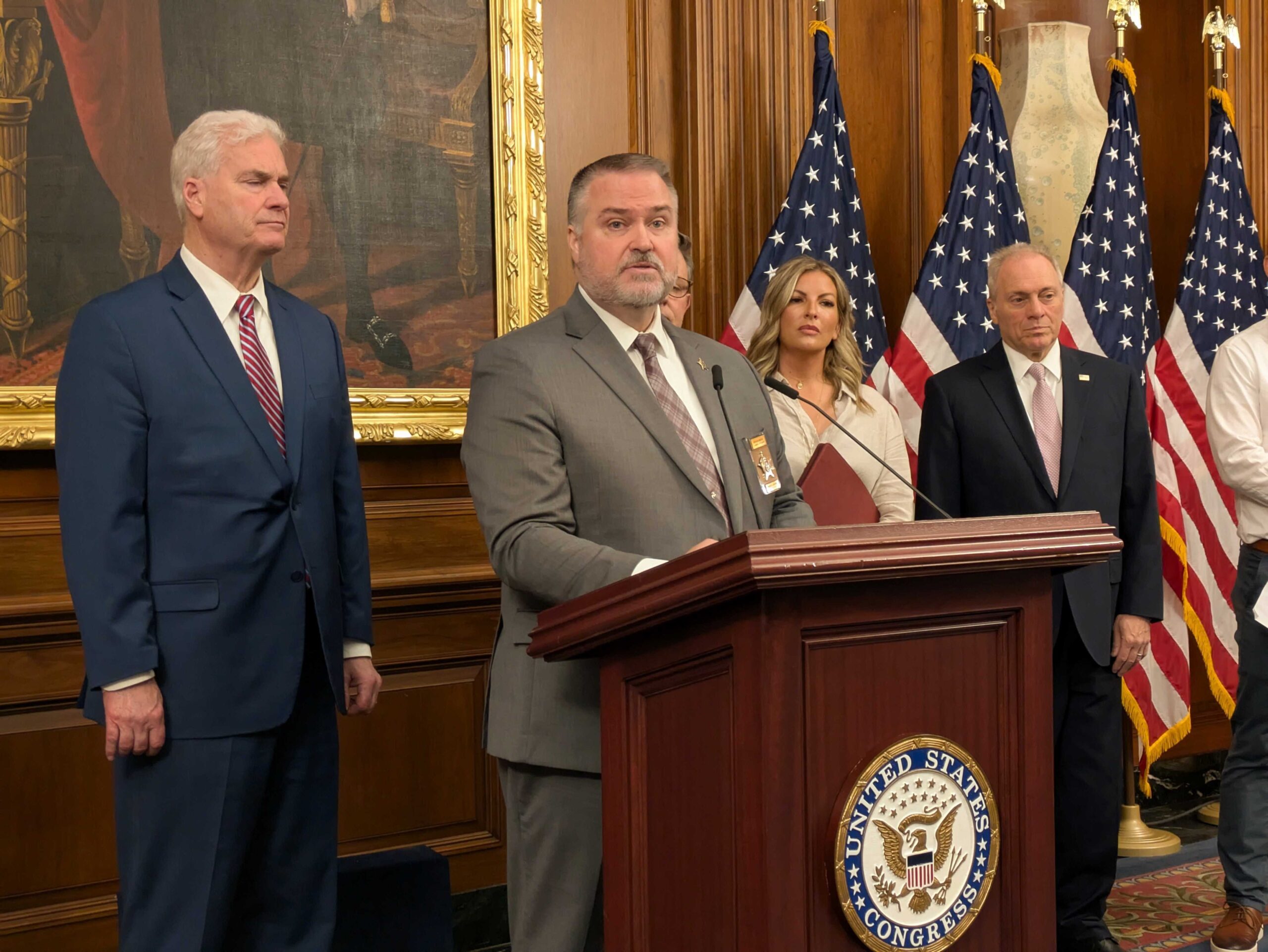U.S. Senate Majority Leader John Thune, R-South Dakota, speaks to Rotary members on April 17, 2025, at the Elks Lodge in Watertown. (Makenzie Huber/South Dakota Searchlight)
This report has been updated.
WASHINGTON — U.S. Senate Republicans were scrambling Tuesday to restructure several proposals in the “big, beautiful bill” that don’t meet their chamber’s strict rules for passing a reconciliation package, while GOP lawmakers on the other side of the Capitol warned those changes may doom its passage in the House.
Senate Majority Leader John Thune, R-S.D., said he and several others are working on a way to bolster rural hospitals, which could experience financial strain as a result of the various changes to Medicaid and other health care programs in the package.
“We are working on a solution for rural hospitals and that’s something that’s been in the works now for several days in response to a number of concerns that our colleagues have mentioned in ensuring that the impact on rural hospitals be lessened, be mitigated,” Thune said. “And I think we’re making good headway on that solution.”
Thune said GOP lawmakers shouldn’t let the “perfect be the enemy of the good,” though he predicted there “could be” two or three Republicans who vote against the package.
“We’ve got a lot of very independent-thinking senators who have reasons and things that they’d like to have in this bill that, in their view, would make it stronger,” Thune said. “But at the end of the day this is a process whereby not everybody is going to get what they want. And we have to get to 51 in the United States Senate.”
More objections to Medicaid cuts
Missouri Sen. Josh Hawley, who has been vocal about Medicaid changes and rural hospitals, said he had “no details whatsoever” about the rural hospital fund or how it would work if it’s added to the bill.
But he said he’s not going to support a bill that takes away working people’s health care.
“We’ve got 1.3 million people on Medicaid in Missouri, hundreds of thousands of kids. That’s 21% of my population. Most of these people are working people. They’re on Medicaid, not because they’re sitting around at home; they’re on Medicaid because they don’t have a job that gives them health care and they cannot afford to buy it on the exchange,” Hawley said. “They don’t want to be, but it’s their only option. And I just think it’s wrong to take away health care coverage from those folks. Now if they’re not working, then sure, they should be.”
Senate Republican Policy Committee Chair Shelley Moore Capito, R-W.Va., said she had a “lengthy discussion” with her home state’s hospital association earlier in the day.
“This has a lot of impacts and we want to make sure we have a lot of rural hospitals. That’s why this rural hospital fund idea is developing,” Capito said. “I don’t think anything is set yet but that is an issue. I think Medicaid, we need to preserve it for the people it’s intended for and get rid of the people who don’t deserve it and don’t qualify and are bilking the system.”
Capito said she hadn’t yet formed an opinion on the rural hospital fund since there isn’t yet a formal proposal written down.
Public lands
In one major development, the Senate parliamentarian ruled Monday that a controversial provision championed by Senate Energy and Natural Resources Chairman Mike Lee to mandate the sale of at least 2 million acres of public lands in 11 Western states did not comply with the chamber’s rules for reconciliation.
Lee, a Utah Republican, has said the provision would free up land to build new housing. But Democrats and some Republicans from the affected states strongly opposed it.
Lee said on social media Monday evening that he was working to rewrite the proposal to comply with reconciliation rules. A spokesperson for his office did not return a message seeking comment Tuesday morning.
SNAP cost-sharing under debate
In another turn of events, Senate Agriculture Chairman John Boozman, R-Ark., earlier Tuesday had announced the panel successfully reworked a provision that would transfer some of the cost of the Supplemental Nutrition Assistance Program to state governments.
But a spokesperson for the panel said later that the parliamentarian actually has not yet made a ruling. The spokesperson said “we’ve gotten some clarification from leadership and it’s steering in the direction it would be compliant but not official.”
Boozman earlier had said his proposal would improve SNAP. “Our commonsense approach encourages states to adopt better practices, reduce error rates, be better stewards of taxpayer dollars, and prioritize the resources for those who truly need it,” Boozman wrote in a statement.
The new language, if accepted, would give states the option of selecting fiscal year 2025 or 2026 as the year that the federal government uses to determine its payment error rate for SNAP, which will then impact how much of the cost the state has to cover starting in fiscal year 2028. Afterward, a state’s payment error rate will be calculated using the last three fiscal years.
Any state with an error rate higher than 6% will have to cover a certain percentage of the cost of the nutrition program for lower income households.
Rushing toward deadline
The internal debates among lawmakers about how to rewrite major pieces of the tax and spending cuts package have led to a rushed feeling among Republican leaders, who have repeatedly promised to approve the final bill before the Fourth of July — an exceedingly tight timeline.
Speaker Mike Johnson, R-La., said during a press conference shortly after a closed-door House GOP conference meeting Tuesday that he’s hopeful the final bill that comes out of the Senate won’t make too many changes to what the House approved earlier this year.
“I remain very optimistic that there’s not going to be a wide chasm between the two products — what the Senate produces and what we produce,” Johnson said. “We all know what the touchpoints are and the areas of greatest concern.”

Republicans, he said, know they need to focus on preserving a fragile compromise on the state and local tax deduction, or SALT, that helps offset the cost of living in some higher-tax states like California, New Jersey and New York.
A deal Johnson brokered with GOP lawmakers in the SALT Caucus has been significantly rewritten in the Senate, but is expected to move back toward the House version, though not entirely.
Johnson also mentioned GOP efforts to roll back certain clean-energy provisions that Democrats approved and President Joe Biden signed into law in their signature climate change, health care and tax package, called the Inflation Reduction Act, or IRA, in 2022.
“We’ve got to get the SALT negotiation number right. We’ve got to make sure the IRA subsidies are handled in an appropriate manner,” Johnson said. “Look, you’ve got a number of provisions.”
Johnson said he expects the Senate to vote on its final bill by Friday or Saturday and that he’s told House lawmakers to “keep your schedules flexible” on being in Washington, D.C., for a final House vote.
Trump goads Republicans
President Donald Trump sought to spur quick approval of a final bill, posting on social media that GOP lawmakers should get the package to him as soon as possible.
“To my friends in the Senate, lock yourself in a room if you must, don’t go home, and GET THE DEAL DONE THIS WEEK. Work with the House so they can pick it up, and pass it, IMMEDIATELY,” Trump wrote Tuesday. “NO ONE GOES ON VACATION UNTIL IT’S DONE. Everyone, most importantly the American People, will be much better off thanks to our work together. MAKE AMERICA GREAT AGAIN!”
Oklahoma Sen. Markwayne Mullin said there are concerns among his fellow Republicans about all of the provisions that must be removed or significantly reworked to meet the complex rules for moving a reconciliation bill through that chamber.
“Every time something comes out that we’re using as a pay for, it takes the deficit reduction down. And they’ve taken out nearly $300 billion so far. We’ve got to make that up,” Mullin said after leaving the closed-door House GOP meeting. “The Senate can’t come in below the House version as far as deficit reduction. So that makes it difficult.”

Mullin, who has been acting as his chamber’s top negotiator with SALT Republicans in the House, told reporters he expects the deduction for state and local taxes to remain at the $40,000 level negotiated in the House. But said the Senate will likely rewrite the $500,000 income ceiling to qualify for the tax deduction.
“I think 40 is a number we’re going to land on,” Mullin said. “It’s the income threshold that’s in negotiations.”
Sen. Kevin Cramer of North Dakota said “most of us would like to make it zero.”
“I hate the idea of $40,000 but if that’s what it takes to pass the bill, I probably could do it. I would like to maybe find some other tweaks to it, somehow, like changing the income levels,” he said.
Treasury Secretary Scott Bessent told reporters he expects a resolution on SALT in the next 24 to 48 hours.
“I had a very successful lunch meeting with the senators. I think that we are on track,” Bessent said.
The ‘red line’ in the House
New York Republican Rep. Mike Lawler told reporters following the closed-door meeting that Senate leaders shouldn’t assume whatever they pass will be accepted by the House.
“I’ve been very clear about where my red line is. So, you know, we’ll let this process play out,” Lawler said. “I think the Senate should recognize the only number that matters is 218, and 50 plus 1. That’s it. And how do you get there?”
Republicans hold 53 seats in the Senate, so leadership cannot lose more than four votes and still approve the package, given that Democrats are universally opposed.
In the House, GOP leaders have 220 seats and need nearly every one of their members to support whatever the Senate sends back across the Capitol for it to make it to the president’s desk before their self-imposed deadline.

In addition to the SALT tax compromise, Lawler said he has concerns about how the Senate has changed other provisions, including those addressing Medicaid, the state-federal health program for lower income people.
“Yeah, there are a number of concerns about decisions that they’re making,” Lawler said. “And obviously, the bill on their side is not final, so we’ll see where it goes.”
Missouri Republican Rep. Jason Smith, chairman of the Ways and Means Committee that crafted the tax provisions in the reconciliation bill, stood by the House’s version of the Opportunity Zone Tax Incentives. The House version extends the incentive from the 2017 Tax Cuts and Jobs Act for a year, while the Senate’s version makes it permanent.
The Opportunity Zone Tax Incentive was pushed by South Carolina Sen. Tim Scott during the first Trump administration, which aimed to create tax cuts for businesses and real estate to invest in low-income communities, but it had mixed results.
“The tax bill that we’re going to deliver is gonna deliver for working families, small businesses and farmers,” Smith said.
Thumbs down from one House Republican
House Freedom Caucus Chairman Andy Harris, R-Md., posted on social media that he doesn’t support how the Senate has changed the bill and that he would seek to block it from becoming law.
“The currently proposed Senate version of the One Big Beautiful Bill weakens key House priorities—it doesn’t do enough to eliminate waste, fraud, and abuse in Medicaid, it backtracks on Green New Scam elimination included in the House bill, and it greatly increases the deficit – taking us even further from a balanced budget.
“If the Senate tries to jam the House with this version, I won’t vote ‘present.’ I’ll vote NO.”
Rattlesnakes and the Senate
West Virginia Republican Sen. Jim Justice told reporters that it’s important for the Senate to take its time in its changes to the reconciliation package and that GOP lawmakers need to be patient.
“If you’re walking through the woods and you look right over there at that wall and there’s a rattlesnake all curled up there and everything, what do you do?” Justice asked. “Most people just jump and take off runnin’, well … rattlesnakes run in pairs and if you just jump left or right or behind, that one can hurt you right there.”
Rattlesnakes are typically solitary creatures, but new research has shown that rattlesnakes are more social than previously thought.
Justice said the best course of action when dealing with a rattlesnake, or two, is to stand still for a moment.
“Look to the left, look to the right, look behind you, and then decide which way you’re going,” he said. “That’s what I think we need to do (in the Senate).”






